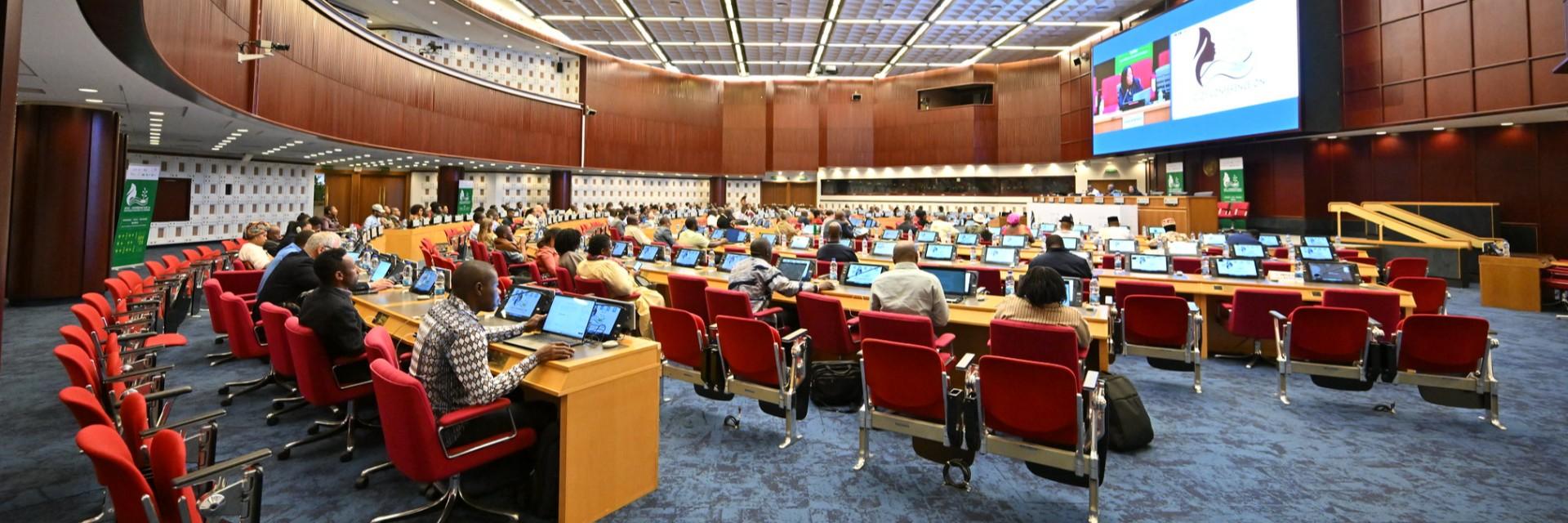Addis Ababa, Ethiopia, 14th November 2025 (ECA) – The 2025 Conference on Land Policy in Africa (CLPA) concluded Thursday, with a unified "Call to Action," which symbolised a continent-wide commitment to transform land governance from a legacy of dispossession into a foundation for justice, reparations, and sovereignty.
Building on the opening day's calls for addressing historical injustices, side events and technical sessions, the conference's final declaration was aimed at moving from diagnosis to prescription, outlining actionable actions for governments, traditional leaders, development partners, civil society, and academia.
The Call-to-Action urges African governments to take the lead by developing comprehensive national frameworks that merge land restitution, cultural heritage recovery, and reparations into a single policy structure. This includes restoring indigenous place names and sacred sites, and establishing dedicated national restitution funds.
A key directive is the formal recognition and safeguarding of customary land tenure systems, which govern over 80% of Africa's land. The call demands the harmonization of customary and statutory laws, closing gaps left by colonial legacies, and ensuring equitable access for women, youth, and marginalized groups. Governments are also tasked with infusing technology into land governance for transparency and improving management of peri-urban areas facing rapid urbanization.
The Call to Action called upon the Forum of African Traditional Authorities (FATA) to be a central agent of reform. Traditional leaders are urged to advocate for transparency through tools like Customary Land Secretariats to curb corrupt practices, such as multiple land sales.
FATA was also urged to lead community dialogues to reform discriminatory customs that negatively impact women and youth, and to actively promote the inclusion of queen mothers and young people in land governance structures. Furthermore, they were tasked with building bridges with the African diaspora to address cultural heritage and restitution.
International development partners were urged to better coordinate their efforts and align financial support, moving away from isolated projects toward joint, continentally-owned initiatives. They were called to prioritize funding for the land agenda and integrate it into global discussions on climate and biodiversity.
Non-state actors, including civil society organizations, were asked to hold governments and global actors accountable for land grabs and "fortress conservation”, to partner with researchers to counter the myth of "idle" land, and to build African Land Data Sovereignty. A major upcoming initiative is a Women's Land Rights Conference in 2026 aimed at mobilizing advocacy on these issues.
Civil society actors were charged with connecting African and diaspora movements to demand reparations, supporting reconnection programs and investment in ancestral homelands.
The Call-to-Action charged academia and research institutions with a fundamental shift in purpose - to revamp curricula to include decolonization, climate change, and artificial intelligence, and to prioritize youth in their training.
The research agenda, concluded the Conference, must be reoriented towards decolonizing land relations and studying emerging forms of collective land tenure. Knowledge must be democratized by disseminating research in local languages and through accessible formats and communications tools, including policy briefs and films, to ensure communities are well served.
The declaration affirmed the CLPA itself as the continent's premier platform for knowledge sharing and called for sustained support to ensure its future.
Speaking at the closing session, Janet Edeme, Head of Division, Rural Development, and Head of Agriculture and Food Security Division at the African Union Commission said, This year’s conference, held under the theme “Land Governance, Justice, and Reparations for Africans and Descendants of People of the African Diaspora,” has truly challenged us to rethink the meaning and value of land in our societies.
“We have gone beyond the technicalities of land administration to embrace its deeper significance as a source of justice, identity, dignity, and belonging. Throughout our deliberations, we have heard from Ministers, policymakers, youth leaders, women, traditional authorities, researchers, and private sector actors each contributing unique perspectives that enrich our collective understanding.”
“What has become clear is that Africa’s land issues are not just about boundaries or titles; they are about fairness, human rights, and the promise of shared prosperity,” she added.
For his part, Nassim Oulmane, representing Executive Secretary, Claver Gatete noted that the discussions under the theme of Land Governance, Justice and Reparations for Africans and Descendants of People of The African Diaspora “have been insightful, thought-provoking, and inspirational. They have set in motion ideas that can guide policy formulation and the development of programs for secure land rights for all, climate resilience, agri-food systems, financing of the land sector, and restorative justice.”
The Conference brought together 440 in-person participants from 39 countries, including 14 from outside Africa, representing the broad base of stakeholders. Notably, there were 50 participants from academic and research institutions, 100 NGOs, 30 government representatives and 9 traditional authorities. Over 100 participants attended online.
The Scientific Committee received 391 paper abstracts. Out of these, 85 papers were reviewed and selected for presentation at the Conference. Twenty-two papers were presented virtually. There were 30 side-events and 13 Master classes. The plenary sessions, the Round Tables for Land Commissions, traditional authorities and the Vice-Chancellors’ events were aimed at unpacking the challenges and opportunities in land governance, and to dismantle the unyielding traces of colonialism in their various forms in the land sector.
Additionally, the CLPA integrated the arts through evocative opening and closing spoken word performances by Prisca of Scar Poetry and an art installation representing thought-provoking perspectives on the CLPA theme from the Diaspora, Ethiopian visual artists from Makush Gallery and quotes from a forthcoming second Anthology of Short Stories on Land.
More:
CLPA2025 Event site and more info:
https://www.uneca.org/eca-events/clpa2025
Watch the recordings here: CLPA 2025 PLAYLIST:
https://www.youtube.com/playlist?list=PLcfKplk33JTjxHT6OqrrJjhcpN5I9cqmd
CLPA 2025 In photos:
https://www.flickr.com/photos/uneca/collections/72157724375821106/
Issued by:
Communications Section
Economic Commission for Africa
PO Box 3001
Addis Ababa
Ethiopia
Tel: +251 11 551 5826
E-mail: eca-info@un.org

